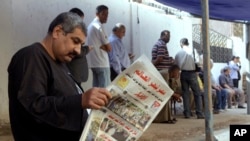CAIRO —
As voting in Egypt's presidential elections winds down, residents say the silent majority has spoken by not showing up to the polls.
During the 2011 revolution, activists on the streets jokingly referred to Egyptians who stayed home as the ‘Hizb al-Kanaba’ or ‘The Couch Party.’ The name stuck and it applies to most Egyptians who want to live their lives, feed their families and do not care all that much who occupies the presidential palace.
Abdelrahman Hany is the opposite of the Kanaba: a human rights worker who took to the streets in 2011, later protested military rule and he joined the crowds in 2013, demanding the resignation of Mohamed Morsi, Egypt’s last president.
But this week, he did not vote.
He said in this election he is proud to be a Kanaba member because he does not support either candidate. Former army chief and de facto Egyptian leader Abdul Fatah el-Sissi will surely win, he said, and challenger Hamdeen Sabahi’s campaign lends legitimacy to the election.
For the second day, trending on Twitter in Egypt was “withdraw Sabahi” in Arabic, posted by activists that want the opposition to pull out in order to tarnish Sissi’s victory.
By not voting, Hany said, activists hope the incoming government will be cautious about heavy-handed tactics for fear of losing the public’s confidence. In the past year under Sissi, thousands of people have been killed or arrested in the name of fighting terrorism.
Several political parties boycotted the election, including Morsi's party, the now banned Muslim Brotherhood. Analysts said low voter turnout could be a combination of boycotts and voter apathy. Everyone knows who will win and Egyptians are tired of voting after six elections in three years.
At a polling station near downtown Cairo a voter named Hanan casts her ballot, saying she was not going to participate, but after they extended the vote for a third day, she felt she had to.
She explained nervously that she felt “they” were “very determined” that people vote, but she does elaborate. Authorities have threatened to fine non-voters and some boycotters have reported being harassed.
But election officials say the government will not enforce a fine upon what could be tens of millions of people who registered, but did not vote.
Election officials also said some people cast blank ballots that will be counted to indicate the voter came in to say he or she did not want either candidate.
But since so many people did not show up, they say it is impossible to know for sure if the Kanaba Party has less love for Sissi than previously assumed, or if they just did not feel like voting.
During the 2011 revolution, activists on the streets jokingly referred to Egyptians who stayed home as the ‘Hizb al-Kanaba’ or ‘The Couch Party.’ The name stuck and it applies to most Egyptians who want to live their lives, feed their families and do not care all that much who occupies the presidential palace.
Abdelrahman Hany is the opposite of the Kanaba: a human rights worker who took to the streets in 2011, later protested military rule and he joined the crowds in 2013, demanding the resignation of Mohamed Morsi, Egypt’s last president.
But this week, he did not vote.
He said in this election he is proud to be a Kanaba member because he does not support either candidate. Former army chief and de facto Egyptian leader Abdul Fatah el-Sissi will surely win, he said, and challenger Hamdeen Sabahi’s campaign lends legitimacy to the election.
For the second day, trending on Twitter in Egypt was “withdraw Sabahi” in Arabic, posted by activists that want the opposition to pull out in order to tarnish Sissi’s victory.
By not voting, Hany said, activists hope the incoming government will be cautious about heavy-handed tactics for fear of losing the public’s confidence. In the past year under Sissi, thousands of people have been killed or arrested in the name of fighting terrorism.
Several political parties boycotted the election, including Morsi's party, the now banned Muslim Brotherhood. Analysts said low voter turnout could be a combination of boycotts and voter apathy. Everyone knows who will win and Egyptians are tired of voting after six elections in three years.
At a polling station near downtown Cairo a voter named Hanan casts her ballot, saying she was not going to participate, but after they extended the vote for a third day, she felt she had to.
She explained nervously that she felt “they” were “very determined” that people vote, but she does elaborate. Authorities have threatened to fine non-voters and some boycotters have reported being harassed.
But election officials say the government will not enforce a fine upon what could be tens of millions of people who registered, but did not vote.
Election officials also said some people cast blank ballots that will be counted to indicate the voter came in to say he or she did not want either candidate.
But since so many people did not show up, they say it is impossible to know for sure if the Kanaba Party has less love for Sissi than previously assumed, or if they just did not feel like voting.





